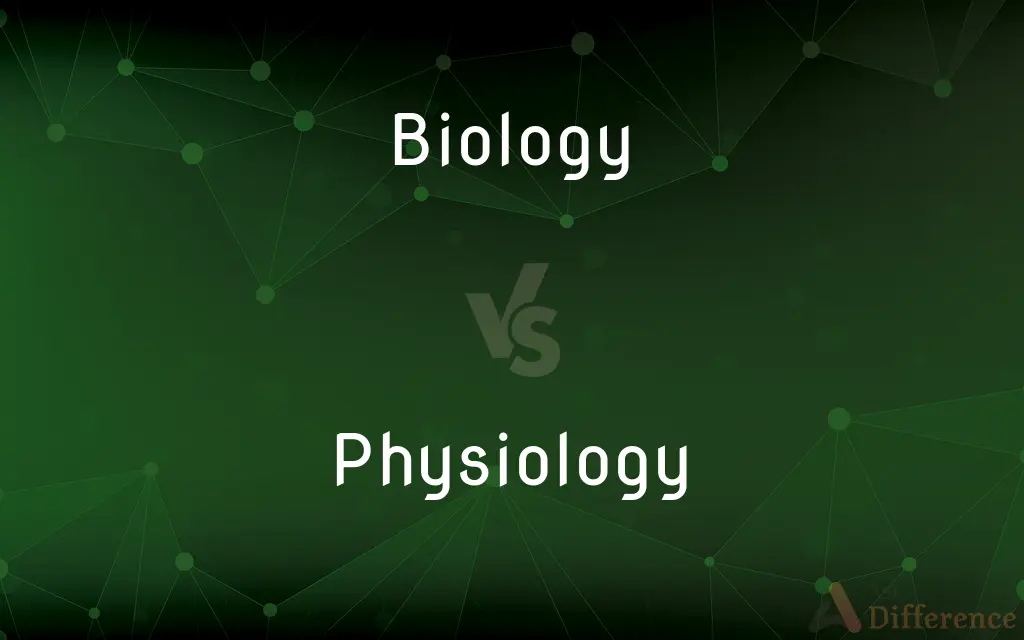Biology vs. Physiology — What's the Difference?
Edited by Tayyaba Rehman — By Fiza Rafique — Updated on March 20, 2024
Biology studies living organisms, their structure, function, growth, origin, evolution, and distribution, while physiology focuses specifically on the functions and mechanisms of living systems.

Difference Between Biology and Physiology
Table of Contents
ADVERTISEMENT
Key Differences
Biology is a broad field that encompasses the study of all aspects of living organisms, including their physical structure, chemical processes, molecular interactions, physiological mechanisms, development, and evolution. It explores the diversity of life, from single-celled organisms to complex multicellular organisms, and the ecosystems in which they live. Whereas physiology delves into the specific functions and processes of living organisms, examining how various body systems work, interact, and respond to challenges. It seeks to understand the mechanisms of action at the cellular, organ, and systemic levels.
While biology covers a wide range of scientific disciplines, including botany, zoology, microbiology, genetics, and ecology, each focusing on different aspects of life and living organisms, physiology is more narrowly focused on understanding how living systems operate and maintain homeostasis. This specialization allows physiologists to explore in-depth the physical and chemical functions of tissues, organs, and organ systems.
In the context of education and research, biology provides a foundational understanding for students and scientists, covering a wide array of topics and theories that explain the living world. On the other hand, physiology is often studied with a focus on applying this knowledge to specific fields such as medicine, healthcare, sports science, and pharmacology, where understanding the functional aspects of the body is crucial.
Biological research can range from studying the ecological interactions that sustain biodiversity to unraveling the genetic codes that dictate the development of an organism. Physiology, however, often focuses on experimental approaches to understand how organisms, organ systems, tissues, and cells perform their functions under various conditions and stresses.
While biology offers a comprehensive view of life in all its forms and interactions, physiology provides a detailed understanding of the life processes and functions at various levels of organization. This complementary relationship enriches our overall understanding of living systems and their operations.
ADVERTISEMENT
Comparison Chart
Scope
Broad, covering all living organisms and their interactions.
Narrow, focusing on the functions and mechanisms of life.
Sub-disciplines
Includes botany, zoology, microbiology, genetics, ecology, etc.
Includes cellular, organ, and systemic physiology.
Focus
Studies structure, function, growth, origin, evolution, and distribution
Focuses specifically on functions and mechanisms.
Application Fields
Broad applications in conservation, research, biotechnology, etc.
Primarily applied in medicine, healthcare, sports science.
Research Approach
Varied, including observational, experimental, and theoretical.
Mainly experimental, focusing on function under conditions.
Compare with Definitions
Biology
Biology is crucial for developing biotechnological applications and understanding diseases.
Creating genetically modified organisms (GMOs) for agriculture relies on genetic and molecular biology.
Physiology
The branch of biology that studies the normal functions of living organisms and their parts.
Exploring how the human heart pumps blood illustrates physiology's focus on organ function.
Biology
Biology explores the life cycle, metabolic processes, and genetic patterns of living entities.
Analyzing the photosynthesis process in plants delves into plant biology.
Physiology
Physiology covers areas such as neurophysiology, cardiovascular physiology, and respiratory physiology.
Studying breathing mechanisms falls under respiratory physiology.
Biology
It investigates the evolutionary processes that have shaped the diversity of life on Earth.
Studying fossil records to understand evolution showcases biology's evolutionary biology branch.
Physiology
This field often uses experiments to understand physiological responses under various conditions.
Measuring muscle response to exercise tests physiology's interest in body function during physical activity.
Biology
The study of living organisms and their interactions with one another and their environments.
Studying the impact of deforestation on biodiversity examines biology's ecological aspect.
Physiology
Physiology investigates how organisms, organ systems, cells, and biomolecules carry out chemical and physical functions.
Researching how neurons transmit signals delves into cellular physiology.
Biology
A scientific discipline that encompasses a variety of sub-fields such as genetics, ecology, and microbiology.
Researching antibiotic resistance involves biology's microbiological and genetic facets.
Physiology
It applies knowledge of biological functions to diagnose and treat diseases in medicine.
Understanding insulin's role in glucose metabolism is fundamental in treating diabetes, illustrating physiology's medical application.
Biology
Biology is the scientific study of life. It is a natural science with a broad scope but has several unifying themes that tie it together as a single, coherent field.
Physiology
Physiology (; from Ancient Greek φύσις (physis) 'nature, origin', and -λογία (-logia) 'study of') is the scientific study of functions and mechanisms in a living system. As a sub-discipline of biology, physiology focuses on how organisms, organ systems, individual organs, cells, and biomolecules carry out the chemical and physical functions in a living system.
Biology
The study of living organisms, divided into many specialized fields that cover their morphology, physiology, anatomy, behaviour, origin, and distribution.
Physiology
The biological study of the functions of living organisms and their parts.
Biology
The science of life and of living organisms, including their structure, function, growth, origin, evolution, and distribution and encompassing numerous fields such as botany, zoology, mycology, and microbiology.
Physiology
All the functions of a living organism or any of its parts.
Biology
The life processes or characteristic phenomena of a group or category of living organisms
The biology of fungi.
Physiology
A branch of biology that deals with the functions and activities of life or of living matter (as organs, tissues, or cells) and of the physical and chemical phenomena involved.
Biology
The living organisms present in a specific area or region.
Physiology
(obsolete) The study and description of natural objects; natural science.
Biology
The study of all life or living matter.
Physiology
The science which treats of the phenomena of living organisms; the study of the processes incidental to, and characteristic of, life.
Biology
The living organisms of a particular region.
Physiology
A treatise on physiology.
Biology
The structure, function, and behavior of an organism or type of organism.
The biology of the whale
Physiology
The branch of the biological sciences dealing with the functioning of organisms
Biology
The science of life; that branch of knowledge which treats of living matter as distinct from matter which is not living; the study of living tissue. It has to do with the origin, structure, development, function, and distribution of animals and plants.
Physiology
Processes and functions of an organism
Biology
The science that studies living organisms
Biology
Characteristic life processes and phenomena of living organisms;
The biology of viruses
Biology
All the plant and animal life of a particular region
Common Curiosities
Can physiology be considered a subset of biology?
Yes, physiology can be considered a subset of biology because it focuses on specific aspects of biological functions and processes within the broader study of life.
What kind of careers can one pursue with a background in biology or physiology?
Careers in biology can be diverse, including research, conservation, biotechnology, and education. In physiology, careers are often focused on healthcare, such as medicine, physical therapy, sports science, and research.
Why is physiology important in medicine?
Physiology is crucial in medicine because it helps in understanding how the human body functions normally, which is essential for diagnosing, treating, and preventing diseases.
Can studies in physiology contribute to advancements in biotechnology and pharmacology?
Yes, physiological studies contribute to biotechnology and pharmacology by providing foundational knowledge on biological functions and mechanisms, aiding in the development of new technologies and drugs.
What is the main difference between biology and physiology?
The main difference is that biology is the broad study of living organisms and their interactions, while physiology specifically examines the functions and mechanisms of living systems.
What role does genetics play in both biology and physiology?
In biology, genetics is central to understanding heredity, variation, and evolutionary processes. In physiology, genetics informs on how genes influence physiological traits and disease susceptibilities, linking genotype to phenotype.
How do biology and physiology complement each other?
Biology provides a comprehensive understanding of living organisms, which forms the basis for physiology to explore how these organisms and their components function and interact at different levels.
How do environmental factors influence the studies of biology and physiology?
In biology, environmental factors are studied for their impact on ecosystems, species interactions, and biodiversity. In physiology, environmental influences on organismal, cellular, and molecular functions are explored, highlighting adaptability and stress responses.
How does the study of physiology impact our understanding of diseases?
Physiology enhances our understanding of diseases by revealing how normal bodily functions are altered or impaired, providing insight into disease mechanisms and potential therapeutic targets.
In what ways do biology and physiology intersect with other scientific disciplines?
Both fields intersect with other disciplines such as chemistry (biochemistry), physics (biophysics), and computer science (bioinformatics), enriching our understanding of life from molecular to systemic levels.
Share Your Discovery

Previous Comparison
BCC vs. FCC
Next Comparison
Catch vs. HuntAuthor Spotlight
Written by
Fiza RafiqueFiza Rafique is a skilled content writer at AskDifference.com, where she meticulously refines and enhances written pieces. Drawing from her vast editorial expertise, Fiza ensures clarity, accuracy, and precision in every article. Passionate about language, she continually seeks to elevate the quality of content for readers worldwide.
Edited by
Tayyaba RehmanTayyaba Rehman is a distinguished writer, currently serving as a primary contributor to askdifference.com. As a researcher in semantics and etymology, Tayyaba's passion for the complexity of languages and their distinctions has found a perfect home on the platform. Tayyaba delves into the intricacies of language, distinguishing between commonly confused words and phrases, thereby providing clarity for readers worldwide.
















































